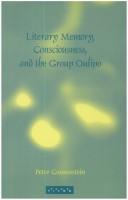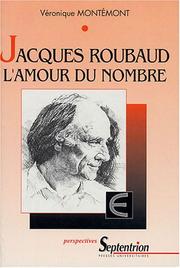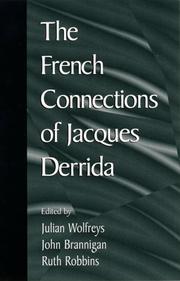| Listing 1 - 9 of 9 |
Sort by
|
Book

ISBN: 2753591555 2753543054 Year: 2022 Publisher: Rennes : Presses universitaires de Rennes,
Abstract | Keywords | Export | Availability | Bookmark
 Loading...
Loading...Choose an application
- Reference Manager
- EndNote
- RefWorks (Direct export to RefWorks)
Jacques Jouet constitue l’une des figures les plus représentatives de l’Oulipo. Après les fondateurs (Queneau, Le Lionnais…) et la génération des Perec et Roubaud, il appartient à cette troisième vague née des ateliers d’écriture et portée par le virage de l’oralisation et de la rencontre avec le public. L’œuvre de Jacques Jouet, l’une des plus conséquentes de l’Oulipo actuel, se distingue par sa polygraphie (poèmes, récits, nouvelles et romans, théâtre, essais, collages), par des formes marquantes (le « poème de métro »), mais aussi par des entreprises au long cours comme Navet, linge, œil de vieux (écriture d’un poème par jour, de 1992 à 1998) ou le cycle de Mek-Ouyes, qui traverse genres et supports puisqu’il a pu prendre notamment la forme d’un feuilleton diffusé en ligne. Les Actes (assortis d’un entretien et d’un inédit) de ce premier colloque international consacré à J. Jouet mettent en lumière la diversité des formes et des entreprises de l’auteur tout en cherchant à éclairer la cohérence globale de sa démarche littéraire.
Literary Reviews --- Literary Theory & Criticism --- littérature --- Oulipo
Book
ISBN: 9786078587476 6078587471 Year: 2021 Publisher: Mexico : Universidad Iberoamericana Puebla,
Abstract | Keywords | Export | Availability | Bookmark
 Loading...
Loading...Choose an application
- Reference Manager
- EndNote
- RefWorks (Direct export to RefWorks)
Creation (Literary, artistic, etc.) --- Literary form --- Fiction --- Play in literature. --- History --- Technique. --- Oulipo (Association)
Book
ISBN: 9781800348448 1800348444 Year: 2021 Publisher: Liverpool Liverpool University Press
Abstract | Keywords | Export | Availability | Bookmark
 Loading...
Loading...Choose an application
- Reference Manager
- EndNote
- RefWorks (Direct export to RefWorks)
French literature --- Roubaud, Jacques --- Garréta, Anne --- Perec, Georges --- Bénabou, Marcel --- Autobiography --- French literature. --- Literature, Experimental --- Literature, Experimental. --- Schreibwerkstatt. --- French authors --- History and criticism. --- French authors. --- History and criticism --- Oulipo (Association). --- Oulipo. --- 1900-1999. --- France.

ISBN: 9042014385 9004489509 9789042014381 9789004489509 Year: 2002 Volume: 220 Publisher: Amsterdam: Rodopi,
Abstract | Keywords | Export | Availability | Bookmark
 Loading...
Loading...Choose an application
- Reference Manager
- EndNote
- RefWorks (Direct export to RefWorks)
The question of memory intrigues us more and more as industrialized societies move further and further away from the written word. In the past the role of memory was integral to literary history, precise mnemonics served as the support systems for erudition, and Mnemosyne was mother of the Muses. The group Oulipo, born in reaction to the Surrealists, proposes, invents, and applies novel literary constraints. Using memory, and best of all conscious memory, as a theoretical starting point, the implications of writing under constraint are analyzed. First, writing under constraint is viewed as a new mnemonics; second, the spiritual component of such a practice is shown to redefine a notion of inspiration; third, constraints and their relationship with games and society is highlighted; finally the manner in which they build a literary consciousness is studied through the lenspiece of contemporary neurobiological research. For the first time the work of the group Oulipo, and the member's emphasis on the function of literature, is placed in historical, cultural, and philosophical context.
Literature --- Memory in literature --- Surrealism (Literature) --- Oulipo (Association) --- History and criticism --- Surrealism (Literature) - France --- Conscience --- Consciousness --- Memory
Book
ISBN: 2377471781 2377470955 Year: 2020 Publisher: Grenoble UGA Éditions
Abstract | Keywords | Export | Availability | Bookmark
 Loading...
Loading...Choose an application
- Reference Manager
- EndNote
- RefWorks (Direct export to RefWorks)
Cet ouvrage propose une réflexion unique sur la genèse des romans de Raymond Queneau, écrivain et poète français, qui a donné naissance à de nombreuses œuvres burlesques et expérimentales. Les multiples brouillons, précieusement conservés et classés par Queneau lui-même, représentent une véritable richesse littéraire. Proposant une nouvelle méthode d’analyse, à la fois critique et génétique, par l’étude des avant-textes de Pierrot mon ami, des Fleurs bleues et du Vol d’Icare, cet ouvrage nous invite à découvrir les coulisses de la création quénienne et nous propose des images inédites de brouillons de manuscrits. C’est la première fois qu’une telle étude est menée sur ce corpus.
Literary Reviews --- Literary Theory & Criticism --- Literature (General) --- littérature française --- genres littéraires --- critique génétique --- Oulipo --- narratologie --- Queneau
Book
ISBN: 0674065271 0674069625 9780674069626 9780674065277 9780674065772 0674065778 Year: 2012 Publisher: Cambridge, Mass. Harvard University Press
Abstract | Keywords | Export | Availability | Bookmark
 Loading...
Loading...Choose an application
- Reference Manager
- EndNote
- RefWorks (Direct export to RefWorks)
What sort of society could bind together Jacques Roubaud, Italo Calvino, Marcel Duchamp, and Raymond Queneau-and Daniel Levin Becker, a young American obsessed with language play? Only the Oulipo, the Paris-based experimental collective founded in 1960 and fated to become one of literature's quirkiest movements. An international organization of writers, artists, and scientists who embrace formal and procedural constraints to achieve literature's possibilities, the Oulipo (the French acronym stands for "workshop for potential literature") is perhaps best known as the cradle of Georges Perec's novel A Void, which does not contain the letter e. Drawn to the Oulipo's mystique, Levin Becker secured a Fulbright grant to study the organization and traveled to Paris. He was eventually offered membership, becoming only the second American to be admitted to the group. From the perspective of a young initiate, the Oulipians and their projects are at once bizarre and utterly compelling. Levin Becker's love for games, puzzles, and language play is infectious, calling to mind Elif Batuman's delight in Russian literature in The Possessed. In recent years, the Oulipo has inspired the creation of numerous other collectives: the OuMuPo (a collective of DJs), the OuMaPo (marionette players), the OuBaPo (comic strip artists), the OuFlarfPo (poets who generate poetry with the aid of search engines), and a menagerie of other Ou-X-Pos (workshops for potential something). Levin Becker discusses these and other intriguing developments in this history and personal appreciation of an iconic-and iconoclastic-group.
Literary form. --- Authors, American --- Form, Literary --- Forms, Literary --- Forms of literature --- Genre (Literature) --- Genre, Literary --- Genres, Literary --- Genres of literature --- Literary forms --- Literary genetics --- Literary genres --- Literary types (Genres) --- Literature --- Levin Becker, Daniel. --- Oulipo (Grupo) --- Literary form --- Oulipo (Association) --- Ouvroir de littérature potentielle
Multi
ISBN: 9090132961 Year: 1999 Publisher: Brussel Clemens Arts
Abstract | Keywords | Export | Availability | Bookmark
 Loading...
Loading...Choose an application
- Reference Manager
- EndNote
- RefWorks (Direct export to RefWorks)
Proefschriften --- Thèses --- 840 "19" --- 82.0 --- Franse literatuur--20e eeuw. Periode 1900-1999 --- Literatuurtheorie --- 82.0 Literatuurtheorie --- 840 "19" Franse literatuur--20e eeuw. Periode 1900-1999 --- OULIPO. --- Tel quel

ISBN: 2859398546 2757422499 Year: 2019 Volume: *6 Publisher: Villeneuve d'Ascq : Presses universitaires du Septentrion,
Abstract | Keywords | Export | Availability | Bookmark
 Loading...
Loading...Choose an application
- Reference Manager
- EndNote
- RefWorks (Direct export to RefWorks)
"Compositeur de poésie, de mathématique et de littérature" : c’est ainsi qu’aime à se définir Jacques Roubaud, né en 1932. Son œuvre est un continent complexe, où la prose se mêle à la poésie, les Troubadours aux poètes du Japon ancien, l’humour à la gravité. À l’impermanence des choses et des êtres, Roubaud oppose la cohérence d’une création suprêmement ordonnée, dont le temps, l’amour, le deuil et la mémoire sont les fondements. L’amour du nombre permet la création ou la restauration de formes exigeantes, ordonnant à la fois la parole et l’image qu’elle renvoie du monde. Cet ouvrage offre pour la première fois une vue globale et panoramique de l’œuvre, tout en ouvrant des pistes de lecture jusqu’ici peu explorées : Roubaud et la musique, la mathématique, la théorie du rythme abstrait, la photographie, l’art contemporain.
Symbolism of numbers in literature --- Mathematics in literature --- Symbolisme des nombres dans la littérature --- Mathématiques dans la littérature --- Roubaud, Jacques --- Symbolisme des nombres dans la littérature --- Mathématiques dans la littérature --- French literature --- 20th century --- Criticism --- Criticism and interpretation. --- Literary Theory & Criticism --- littérature --- Japon --- rythme --- mathématiques --- Oulipo --- Roubaud, Jacques.

ISBN: 0585089868 9780585089867 0791441318 0791441326 1438424345 Year: 1999 Publisher: Albany (N.Y.) : State university of New York press,
Abstract | Keywords | Export | Availability | Bookmark
 Loading...
Loading...Choose an application
- Reference Manager
- EndNote
- RefWorks (Direct export to RefWorks)
The French Connections of Jacques Derrida offers stimulating and accessible essays that address, for the first time, the issue of Derrida's relation to French poetics, writing, thought, and culture. In addition to offering considerations of Derrida through studies of such significant French authors as Mallarm, Baudelaire, Valry, Laporte, Ponge, Perec, Blanchot, and Barthes, the book also reassesses the development of Derrida's work in the context of structuralism, biology, and linguistics in the 1960s, and looks at the possible relationships between Derrida's writing and that of the Surrealist and Oulipa groups. Derrida is introduced as one whose work is as much poetic as it is philosophical, and who is strikingly French and yet not unproblematically so.[Contributors include Boris Belay, John Brannigan, Christopher Johnson, John P. Leavey, Jr., Ian Maclachlan, Jessica Maynard, Laurent Milesi, Ruth Robbins, Michael Syrotinski, Michael Temple, Burhan Tufail, and Julian Wolfreys.]
Difference (Philosophy). --- French literature --- Literature --- Philosophy, French. --- History and criticism. --- Philosophy. --- Difference (Philosophy) --- Derrida, Jacques. --- Oulipo (Association) --- French philosophy --- Philosophy --- Literature and philosophy --- Philosophy and literature --- Theory --- Derrida, Jacques --- Derrida, J. --- Derida, Žak --- Derrida, Jackes --- Derrida, Zhak --- Deridah, Z'aḳ --- Deridā, Jāka --- Dirīdā, Jāk --- Деррида, Жак --- דרידה, ז'אק --- Ouvroir de littérature potentielle --- DERRIDA, JACQUES, 1930-2004 --- LITERATURE --- FRENCH LITERATURE --- DIFFERENCE (PHILOSOPHY) --- PHILOSOPHY, FRENCH --- PHILOSOPHY --- LITERARY CRITICISM --- Derrida, Jacques, 1930-2004 --- French Literature --- Philosophy, French --- Literary Criticism --- Derrida, jacques, 1930-2004 --- Difference (philosophy) --- Philosophy, french --- Literary criticism
| Listing 1 - 9 of 9 |
Sort by
|

 Search
Search Feedback
Feedback About UniCat
About UniCat  Help
Help News
News